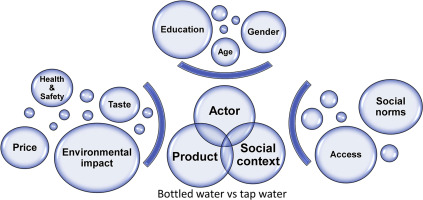当前位置:
X-MOL 学术
›
Water Res.
›
论文详情
Our official English website, www.x-mol.net, welcomes your feedback! (Note: you will need to create a separate account there.)
Bottle or tap? Toward an integrated approach to water type consumption.
Water Research ( IF 12.8 ) Pub Date : 2020-01-31 , DOI: 10.1016/j.watres.2020.115578 Robbe Geerts 1 , Frédéric Vandermoere 1 , Tim Van Winckel 2 , Dirk Halet 3 , Pieter Joos 4 , Katleen Van Den Steen 5 , Els Van Meenen 5 , Ronny Blust 6 , Elena Borregán-Ochando 6 , Siegfried E Vlaeminck 2
Water Research ( IF 12.8 ) Pub Date : 2020-01-31 , DOI: 10.1016/j.watres.2020.115578 Robbe Geerts 1 , Frédéric Vandermoere 1 , Tim Van Winckel 2 , Dirk Halet 3 , Pieter Joos 4 , Katleen Van Den Steen 5 , Els Van Meenen 5 , Ronny Blust 6 , Elena Borregán-Ochando 6 , Siegfried E Vlaeminck 2
Affiliation

|
While in many countries, people have access to cheap and safe potable tap water, the global consumption of bottled water is rising. Flanders, Belgium, where this study is located, has an exceptionally high consumption of bottled water per capita. However, in the interest of resource efficiency and global environmental challenges, the consumption of tap water is preferable. To our knowledge, an integrated analysis of the main reasons why people consume tap and bottled water is absent in Flanders, Belgium. Using Flemish survey data (N = 2309), we first compared tap and bottled water consumers through bivariate correlation analysis. Subsequently, path modelling techniques were used to further investigate these correlations. Our results show that bottled water consumption in Flanders is widespread despite environmental and financial considerations. For a large part, this is caused by negative perceptions about tap water. Many consumers consider it unhealthy, unsafe and prefer the taste of bottled water. Furthermore, we found that the broader social context often inhibits the consumption of tap water. On the one hand, improper infrastructures (e.g. lead piping) can limit access to potable tap water. On the other hand, social norms exist that promote bottled water. Lastly, results suggest that the consumption of bottled water is most common among men, older people and less educated groups. We conclude that future research and policy measures will benefit from an approach that integrates all behavioural aspects associated with water type consumption. This will enable both governments and tap water companies to devise more effective policies to manage and support tap water supply networks.
中文翻译:

瓶子还是水龙头?寻求一种综合的水类型消耗方法。
在许多国家/地区,人们可以使用便宜,安全的自来水,而全球瓶装水的消费却在增加。该研究所在的比利时法兰德斯的人均瓶装水消耗量非常高。但是,出于资源效率和全球环境挑战的考虑,自来水的消耗是可取的。据我们所知,比利时法兰德斯缺乏对人们饮用自来水和瓶装水的主要原因的综合分析。使用弗拉芒语调查数据(N = 2309),我们首先通过二元相关分析比较了自来水和瓶装水的消费者。随后,使用路径建模技术进一步研究这些相关性。我们的结果表明,尽管考虑到环境和经济因素,法兰德斯的瓶装水消费仍很普遍。在很大程度上,这是由于对自来水的负面看法造成的。许多消费者认为它不健康,不安全,并且喜欢瓶装水的味道。此外,我们发现更广泛的社会环境经常抑制自来水的消耗。一方面,不适当的基础设施(例如铅管)会限制对饮用水的使用。另一方面,存在促进瓶装水的社会规范。最后,结果表明,瓶装水的消费在男性,老年人和文化程度较低的人群中最为普遍。我们得出结论,未来的研究和政策措施将受益于将与水类型消耗相关的所有行为方面进行整合的方法。这将使政府和自来水公司能够制定更有效的政策来管理和支持自来水供应网络。
更新日期:2020-01-31
中文翻译:

瓶子还是水龙头?寻求一种综合的水类型消耗方法。
在许多国家/地区,人们可以使用便宜,安全的自来水,而全球瓶装水的消费却在增加。该研究所在的比利时法兰德斯的人均瓶装水消耗量非常高。但是,出于资源效率和全球环境挑战的考虑,自来水的消耗是可取的。据我们所知,比利时法兰德斯缺乏对人们饮用自来水和瓶装水的主要原因的综合分析。使用弗拉芒语调查数据(N = 2309),我们首先通过二元相关分析比较了自来水和瓶装水的消费者。随后,使用路径建模技术进一步研究这些相关性。我们的结果表明,尽管考虑到环境和经济因素,法兰德斯的瓶装水消费仍很普遍。在很大程度上,这是由于对自来水的负面看法造成的。许多消费者认为它不健康,不安全,并且喜欢瓶装水的味道。此外,我们发现更广泛的社会环境经常抑制自来水的消耗。一方面,不适当的基础设施(例如铅管)会限制对饮用水的使用。另一方面,存在促进瓶装水的社会规范。最后,结果表明,瓶装水的消费在男性,老年人和文化程度较低的人群中最为普遍。我们得出结论,未来的研究和政策措施将受益于将与水类型消耗相关的所有行为方面进行整合的方法。这将使政府和自来水公司能够制定更有效的政策来管理和支持自来水供应网络。


























 京公网安备 11010802027423号
京公网安备 11010802027423号